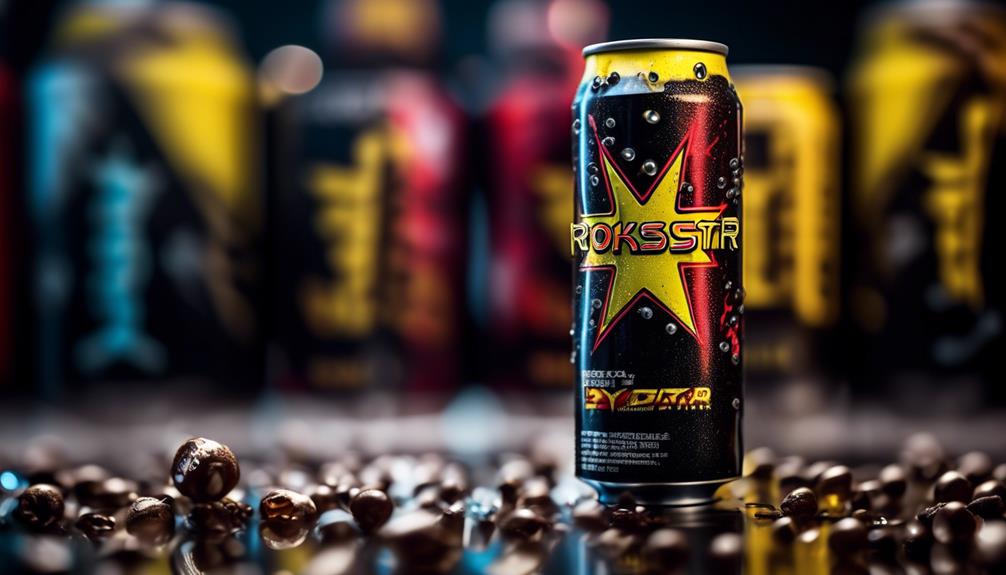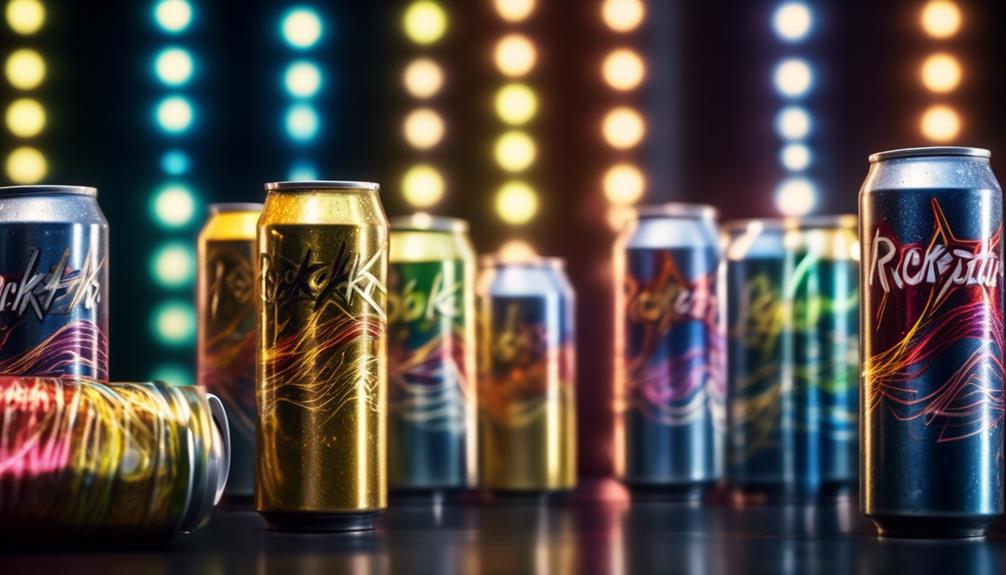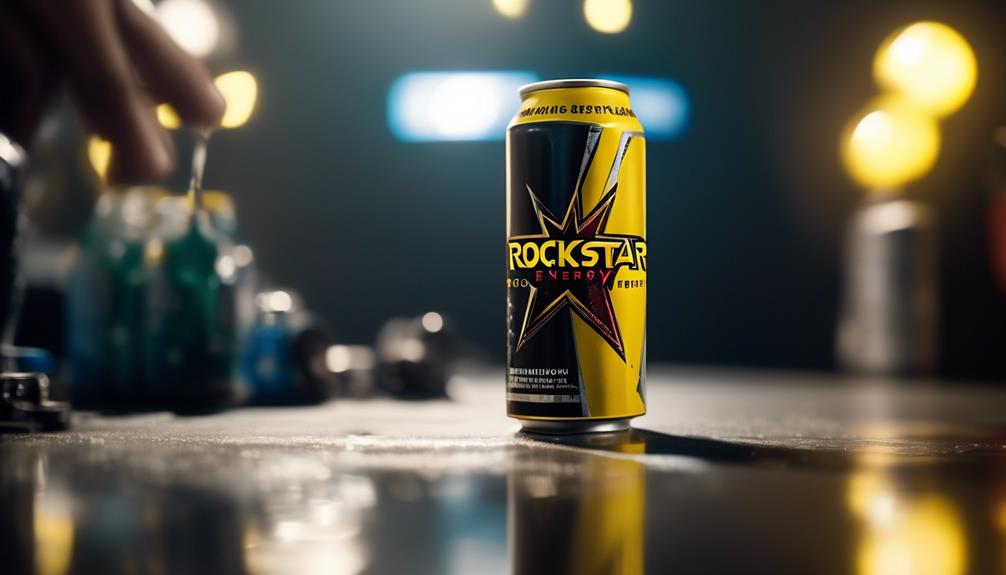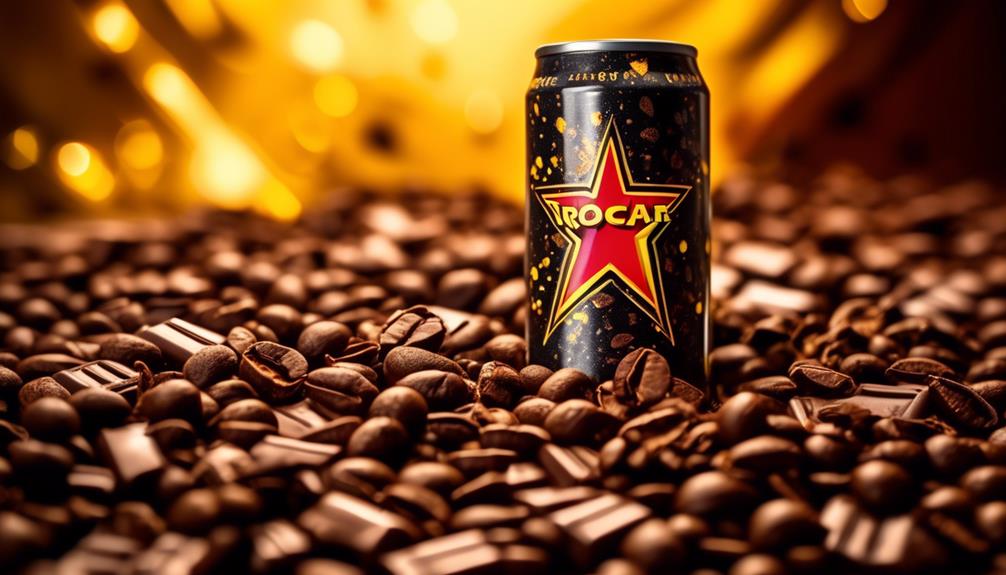Caffeine, a natural stimulant most commonly found in tea, coffee, and cacao plants, has been the subject of numerous studies, particularly with regard to its role in energy drinks. One beverage that often comes under scrutiny is Rockstar, a popular choice among those seeking an energy boost. As consumers, it is crucial to know the exact amount of caffeine we ingest with each serving of such beverages. Recognizing the need for such awareness, this discourse will explore the caffeine content in Rockstar, providing an insightful comparison to other beverages and discussing the potential impact on health. In a world where caffeine consumption is a daily ritual for many, the information you are about to unveil may significantly shape your future dietary decisions.
[ez-toc]
Key Takeaways
- Rockstar energy drink contains 160 milligrams of caffeine per 16 fluid ounce can, which is higher than a standard cup of coffee.
- The high caffeine content in Rockstar is intentional to deliver a strong energy boost.
- Excessive consumption of caffeine can have detrimental health effects, including addiction, withdrawal symptoms, and potential heart disease.
- Rockstar offers a broader range of flavors and a unique blend of ingredients compared to traditional sources of caffeine like coffee and tea.
Understanding Caffeine in Energy Drinks

Frequently, the potent effects of energy drinks are largely attributed to their substantial caffeine content, a stimulant known for its capacity to enhance alertness and ward off fatigue. In the energy drink industry, the caffeine extraction process is a critical component of production, as it directly influences the potency of the final product. Advanced methods of caffeine extraction have been developed, allowing for more precise control over the concentration levels in these beverages.
A scientific analysis of the caffeine extraction process reveals that it involves a series of complex biochemical interactions. Caffeine is derived from naturally occurring plant sources like coffee beans or tea leaves. The process generally involves the use of organic solvents or water to separate caffeine from the plant matter. The resultant extract is then purified, dried, and made ready for use in various products, including energy drinks.
However, the frequent consumption of these caffeine-rich beverages can lead to tolerance development. This phenomenon, often referred to as caffeine tolerance, entails a reduced physiological response to caffeine over time. As a result, regular consumers may experience diminished effects of alertness and energy boost, necessitating increased intake to achieve the same results.
Innovation in the industry has led to a focus on creating products that can deliver the desired energy boost while minimizing the risk of tolerance development. This includes exploring alternative natural stimulants, adjusting caffeine concentrations, and researching the impacts of other ingredients in energy drinks. The goal is to strike a balance between delivering a potent product and promoting responsible consumption patterns among consumers.
Caffeine Content in Rockstar
Expanding upon the broader examination of caffeine in energy drinks, a precise look at the popular brand Rockstar reveals significant insights into its specific caffeine content. The formulation of Rockstar includes a potent mix of ingredients, with caffeine featuring prominently.
Rockstar’s formulation is a blend of caffeine, B vitamins, ginseng, guarana, taurine, and milk thistle among others. However, the focus here is the caffeine content, which stands at a substantial 160 milligrams per 16 fluid ounce can. This amount, while on par with many other energy drinks in the market, is substantially higher than the caffeine content found in a standard cup of coffee, which averages around 95 milligrams.
It’s clear that Rockstar’s high caffeine content is a deliberate part of its formulation, designed to deliver the strong, immediate energy boost that its consumers seek. This aligns with the brand evolution of Rockstar, which has consistently positioned itself as a product for those who lead active and intense lifestyles.
However, it’s worth noting that while caffeine does provide a temporary energy boost, excessive consumption can have detrimental health effects, including heart complications and sleep disruption. The FDA suggests a limit of 400 milligrams of caffeine per day for most adults, meaning a single can of Rockstar constitutes a significant portion of that daily limit.
Comparing Rockstar to Other Beverages

In order to fully comprehend the caffeine content of Rockstar, it is essential to compare it with other popular beverages in the market, highlighting both similarities and differences. This comparative analysis allows us to place Rockstar within the broader landscape of beverage alternatives, while also underlining its distinctive features, rooted in its unique Rockstar history.
- Coffee: Traditionally, coffee has been the go-to source for caffeine, with a standard 8-ounce cup containing approximately 95mg of caffeine. While strong, Rockstar surpasses this with a hefty 160mg of caffeine in a 16-ounce can, making it an attractive, albeit potent, alternative for caffeine seekers.
- Tea: Tea, another common source of caffeine, varies in content depending on the type. The average 8-ounce serving of black tea contains around 47mg of caffeine, significantly less than Rockstar. Even green tea, hailed for its subtle energy boost, only offers about 28mg per 8-ounce serving.
- Energy Drinks: Rockstar’s direct competitors, other energy drinks like Red Bull and Monster, contain approximately 80mg and 160mg of caffeine per 8.4-ounce and 16-ounce serving respectively. This positions Rockstar competitively, offering similar caffeine content to Monster but with a broader range of flavors.
The comparison reveals that Rockstar, with its distinctive blend of caffeine, B-vitamins, and herbs, offers a caffeine content that distinguishes it from traditional sources like coffee and tea. It stands shoulder-to-shoulder with its energy drink competitors, cementing its place in the array of beverage alternatives for those seeking a potent caffeine kick.
Impact of Caffeine on Health
While Rockstar’s high caffeine content establishes its place in the competitive energy drink market, it is crucial to examine the potential health implications of such potent caffeine levels in our diets. With its stimulating effects, caffeine can lead to a state of dependency known as caffeine addiction. This condition, marked by withdrawal symptoms such as headaches and irritability when caffeine consumption is reduced, may affect a person’s overall well-being and productivity.
Scientific research has also revealed potential cardiovascular risks associated with excessive caffeine intake. High doses of caffeine can cause heart palpitations, elevated blood pressure, and, in extreme cases, lead to heart disease. The concern is amplified when considering the common practice of mixing energy drinks with alcohol, which can mask the stimulant’s effects, leading to potential health hazards.
However, it’s worth noting that moderate caffeine consumption can offer benefits such as enhanced cognitive function and increased alertness. Innovation in the formulation of energy drinks, like Rockstar, could balance caffeine’s positive effects against its potential risks. This could involve developing products with lower caffeine content or incorporating natural ingredients to mitigate the adverse effects.
As consumers, it is essential to cultivate an awareness of the potential health impacts of our dietary choices and to understand our personal tolerance to caffeine. This knowledge can guide us in making responsible decisions about our consumption of caffeinated beverages like Rockstar. In the end, the key lies in moderation and in recognising the potential health risks associated with excessive caffeine consumption.
Ways to Moderate Caffeine Intake

To effectively moderate caffeine intake, it is crucial to develop a strategic approach that encompasses understanding individual tolerance, observing consumption habits, and making informed dietary choices. As we navigate this path of moderation, several innovative solutions such as caffeine alternatives and portion control can be employed.
- Understanding individual tolerance: Each person’s body metabolizes caffeine differently, influenced by factors such as age, body mass, and overall health. Research has shown that the average half-life of caffeine in the human body is about 5 hours, but this can range from 1.5 to 9.5 hours. Therefore, it is important to gauge your personal tolerance and adjust your caffeine intake accordingly.
- Observing consumption habits: Regular monitoring of how much and when caffeine is consumed can provide valuable insights. This could involve keeping a food diary or using a digital app. Such tracking can help identify patterns and behaviors that can be modified to control caffeine intake.
- Informed dietary choices: Opting for caffeine alternatives can be an effective strategy. For instance, herbal teas or caffeine-free beverages can satisfy the need for a warm drink without the caffeine. Additionally, portion control is a crucial step in managing caffeine intake. Moderation is key, and reducing the size of your servings can significantly decrease your overall caffeine consumption.
Frequently Asked Questions
What Is the History of Rockstar Energy Drink and Who Manufactures It?
Rockstar Energy Drink, a product of Rockstar Inc., was established in 2001. The company’s robust branding strategy focused on portraying an edgy, active lifestyle, setting it apart from energy drink competitors. Rockstar Inc. is currently owned by PepsiCo, a result of a 2020 acquisition. The history of Rockstar Energy Drink is a testament to the company’s innovative approach in a highly competitive market.
Are There Any Other Active Ingredients in Rockstar Besides Caffeine?
Beyond the jolt of caffeine, Rockstar energy drink is a veritable cocktail of active ingredients. Its nutritional value includes a blend of B-vitamins, taurine, and guarana. These additional ingredients are designed to enhance physical performance, increase concentration, and stimulate metabolism. The combination of these elements in Rockstar makes it not just a caffeine delivery system, but a comprehensive energy drink specifically engineered for those seeking an innovative edge in performance and focus.
Does the Amount of Caffeine in Rockstar Vary Between Different Flavors or Sizes?
The caffeine content in Rockstar energy drinks can indeed vary between different flavors and sizes. The difference is generally due to both Rockstar flavor preferences and individual caffeine sensitivity variation. For instance, a larger can size typically contains more caffeine. Similarly, certain flavors might have a higher caffeine concentration due to specific formulation requirements. Therefore, consumers should be aware of these variations when choosing their preferred Rockstar product.
Are There Any Specific Age Restrictions for Consuming Rockstar?
Rockstar energy drinks, like many others, fall under the umbrella of the FDA’s regulation. However, there is no specific age restriction solely for Rockstar consumption. Nonetheless, due to high caffeine content, it is generally not recommended for children, pregnant or nursing women, and individuals sensitive to caffeine. The potential risks associated with youth consumption of energy drinks have led to calls for further research and policy intervention.
What Are Some Potential Side Effects of Consuming Rockstar, Apart From Those Associated With Caffeine?
Potential side effects of Rockstar consumption, beyond caffeine-related issues, may include increased heart rate, high blood pressure, and potential for addiction. The Rockstar consumption pattern can lead to dependency due to its high sugar and stimulant content. Other Rockstar addiction risks can involve sleep disruptions, anxiety, and digestive issues. It’s crucial to consume energy drinks like Rockstar mindfully and responsibly, being aware of these potential risks.
Conclusion
In conclusion, the caffeine content in Rockstar is significantly higher than other mainstream beverages. While it can provide a temporary boost in energy and alertness, excessive consumption may lead to adverse health effects. As the saying goes, “moderation is key” – it is important to manage caffeine intake to maintain optimal health. The impact of caffeine on our bodies should not be underestimated, thus consumers are urged to be mindful of their consumption habits.

